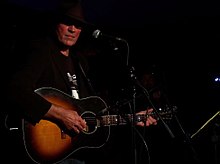Eric Andersen
Eric Andersen (born February 14, 1943 in Pittsburgh ) is an American singer and songwriter .
Life
Childhood and youth
Music played an important role in Eric Andersen's life from an early age. He started playing the guitar at the age of eight and also taught himself to play the piano. In addition to music and school, Andersen worked intensively on the works of Beat Generation authors such as Allen Ginsberg and Jack Kerouac . But Andersen also took in classics like Charles Baudelaire and Arthur Rimbaud . This reading subsequently influenced the style and content of the songs he wrote. Later in his songwriting he always showed a tendency towards the poetic, philosophical and dreamy-romantic.
new York
Andersen moved to Geneva in the US state of New York and attended Hobart College. After two years he dropped out of his studies and hitchhiked to the west coast to San Francisco , where he tried to find an audience for his songs in coffee houses. In 1963 he was finally discovered by Tom Paxton and invited to New York City , where he soon belonged to the then Greenwich Village folk scene around Bob Dylan , Richard and Mimi Farina, Phil Ochs and Joan Baez . Here he also met Deborah Green, a singer and club owner whom he later married.
Musician career
Andersen's music career began in New York. After just a few appearances in Gerde's Folk City and in the Gaslight Cafe , where he already presented his own songs, he received rave reviews in the New York Times in February 1964 and subsequently a record deal with Vanguard Records .
Records
The first album Today Is The Highway (1965) remained an insider tip, but Andersen achieved considerable success with his second album, Bout Changes' N Things , released in 1966 . The piece Thirsty Boots from this album became popular in the version of Judy Collins , while the very poetic language Violets Of Dawn was adopted by musicians of various styles and Andersen "established as a master of the lyrical and romantic ballad". (Roxon)
In the same year he played for the first time at the Newport Folk Festival , after he had been heard at the Cambridge Folk Festival in England the year before. Also in 1966 Andy Warhol made the never-released film Space with him .
Although the New York Times praised him as "one of the most outstanding young song lyricists", Andersen could not always convince on his records. Above all, his 1969 album Avalanche was met with harsh criticism due to its mixture of couplets , blues waltzes, gospel songs and protest songs. The record was described as unsuccessful and Andersen himself attested to be artistic lack of direction.
In other productions, Andersen found more stylistic security and in 1972 he presented an album with Blue River that had a slight country touch and was described as his best work. Blue River was also commercially successful and is to this day Andersen's best-selling record.
In the 1970s and 1980s Andersen toured folk clubs in the US and Europe, made sporadic records and moved to Norway.
Norway
In his new adopted home, Andersen founded his own record label and recorded the album Danko / Fjeld / Andersen in 1991 with Rick Danko and the Norwegian folk singer Jonas Fjeld , which received the Spelleman’s Prize in 1992 , the Norwegian counterpart to the American Grammys . The trio also brought out Ridin 'On The Blinds in 1993 .
Record releases USA
In the meantime, further recordings have also been released in the USA. In 1989 Ghosts Upon The Road was released, which was consistently approved by music critics. The Rolling Stone about it classified "as one of the best albums of the eighties".
In 1991 Stages: The Lost Album came on the market, which was actually intended as a follow-up record for Blue River , but whose master tapes were first lost under unexplained circumstances and suddenly reappeared seventeen years later.
In 1998 the German label Normal Records released Memories Of The Future, in which the idealist and utopian Andersen drew a preliminary interim balance. The record came about in an unusual way. Andersen sent his basic recordings to fellow musicians such as Richard Thompson , Rick Danko and Garth Hudson , who then recorded the free tracks as they saw fit. The German-language edition of Rolling Stone said: “… songs that are definitely socially critical with poetic images, frustration and anger packaged in beautiful metaphors.” In the same year, Andersen toured Europe again.
In You Can't Relieve The Past (2000) Andersen worked on his own story. He played the title song with Lou Reed . Further releases were the double CD Beat Avenue (2003), The Street Was Always There (2004), a nostalgic look back at his time in Greenwich Village and Waves from 2005.
On March 25, 2010 Andersen gave a concert in the Cologne theater Der Keller, which was recorded and published in 2011 as a forty-minute excerpt under the title The Cologne Concert . He was accompanied by the Italian violinist Michele Gazich and his wife Inge Andersen.
Songs by Eric Andersen were a. a. Covered by Bob Dylan , Linda Ronstadt , Johnny Cash , Grateful Dead and Peter, Paul and Mary .
present
Eric Andersen lives with his family near Oslo , regularly commutes between Oslo and New York City, continues to tour and writes songs.
Web link
- Works by Eric Andersen in the catalog of the German National Library
- Eric Andersen's website
| personal data | |
|---|---|
| SURNAME | Andersen, Eric |
| BRIEF DESCRIPTION | American singer and songwriter |
| DATE OF BIRTH | February 14, 1943 |
| PLACE OF BIRTH | Pittsburgh |

